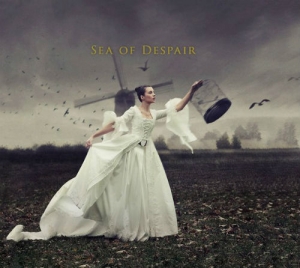
Sea Of Despair are a Russian combo that did celebrate its tenth anniversary earlier this year. Throughout the past decade, they did record and release a handful of EP’s as well as two full lengths. One of those, Mоре Отчaяния (aka More Otchayaniya, which means ‘sea of despair’), was released in June 2009 via Wolfshade Records. That very same label, in collaboration with Metallic Media, now re-releases this material under professional distribution assistance of Satanath Records / Grimm Distribution.
The material was recorded by quite a big bunch of people. The instruments and voices include violins and cello, as well as lots of vocal timbres, both male and female – I will come back to it. Mоре Отчaяния has a total running time of almost three quarters of an hour, and seen the instruments used and the soprano voices (amongst others), along with the typifying (new) artwork and the band’s name, one might already know where to place this band. Hip-hop indeed. Or is it Acid-Jazz? Funk or Punk?...
No, seriously, everything reeks of Gothic-laden Metal, and indeed that is what you get on Mоре Отчaяния. This is clear as from the introduction on: first a melancholic piano melody with the sound of water at the background, soon joined by a softly spoken male voice and a melodic guitar solo, and slowly on transforming into a sad Doom piece, continuously building up stronger and fuller. But is really as from the second song that everything reaches its true raison d’être. This is the purest definition of Gothic Doom Metal, with one big question: is this based on tradition, or is it a collection of clichés? Actually, it is both of them. Throughout the whole album there is quite some variation, yet all the time with that very same background attitude, whether it be copycat stuff or tributing the origins. That’s a decision up to the listener to make. But it does contain everything that characterizes the scene:
Slowly heavy passages, rather rhythmic and forever melodious get interchanged with (semi) acoustic parts.
Leading melodies are based on melancholic guitar soloing, then again on integer violin lines, for example.
There’s room for showing off, i.e. the bass solo at the end of the sixth track (is it really necessary?). Therefor it might strengthen the impression of exaggeration and lacking-own-face. There is no need to do so, I think, if you’re convinced you know what you do (or am I mistaken?).
In between the pretty lengthy Metal compositions there are shorter excerpts of quietude (often, once again, with the very same watery sampling from the opening track), including the spoken words (quite difficult to comprehend the meaning of the story-telling in case you do not understand the Russian tongue, but that might not be an issue evidently).
The catchy rhythm section interacts organically, almost clinically well with the leading parts and vocal lines.
The vocals are quite different too: quite nice female voices (not those high-pitched soprano shrieks) and somewhat ‘calm’ grunts, yet also spoken words (both male and female).
The sound quality is very decent, even over-mixed.
And so on – as you see, quite everything that is needed to create a traditional piece of Goth-Doom Metal. And once again, this brings me to a dual question: whether you do appreciate it, or you do not. Pros are the professional performance, the very nice female vocals, the intention to avoid modernism, the few almost Heavy / Speed-alike guitar solos, and the varying melodies. Cons, however, are the total lack of originality, the über-catchiness of most parts, the predictable song writing, the over-produced sound and the concatenation of clichés.
